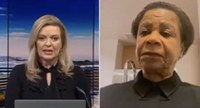Newell, the SABC and the cowardice of silence
Juliet Newell was "removed" from the SABC's broadcasting schedule for being a journalist at a time when moments of journalism are increasingly rare.
Newell, a long-standing presenter on SABC, challenged Dr. Mamphele Ramphele who claimed that the war in Gaza was akin to the Holocaust.
Newell did what any responsible journalist should do: she pushed back. She questioned a statement that was not only provocative, but deliberately framed to inflame. Ramphele's comparison of the war to the Holocaust is not a small claim. It is not a matter of semantics. It is a loaded historical parallel with global resonance, one that risks distorting both history and the present. Any journalist worth their salt is compelled to interrogate it.
The interview arose from Ramphele's issuing a statement on behalf of the Desmond Tutu IP trust, of which she is chair, comparing Israel’s military operation to Nazi actions against Jews in the concentration camps during World War II.
Newell asked Ramphele if she didn’t think her statement likening the famine in Gaza to the Holocaust was “provocative.”
“What provocative? It is a holocaust,” Ramphele answered.
“But how can you compare them?” Newell countered.“Why can’t I compare them?” Ramphele retorted.
“Because they’re different,” Newell answered. “I’m not saying Gaza isn’t horrific. It is horrific. But comparing them, it almost undermines what the Holocaust was all about.”
The consequence of the challenge to Ramphele's claim was that the SABC "removed" Newell from its broadcasting schedule and justified that it “reaffirmed its commitment” to the Broadcasting Act and “its editorial guidelines designed to protect plurality of views, public trust, and credibility of content”, all of which the SABC breached in punishing Newell.
A complaint by the Palestinian Solidarity Campaign about the interview likely contributed to the SABC's cowardice.
The SABC should have backed their own presenter for doing precisely what the Broadcasting Complaints Commission of South Africa Code demands - challenging potentially misleading or biased assertions.
Its media statement cited compliance with nebulous “internal processes” and the Broadcasting Act.
This was not about compliance with professional standards: it was about politics. It has exposed something rotten in our media and our public institutions. It is not simply about one incident. It is about truth, courage, and the duty of journalism in a democracy that prides itself on plurality of voices. Many in the media are failing that test.
The SABC acted not as a public broadcaster safeguarding plurality, but as a political actor calculating the path of least resistance.
Even worse is the silence of our wider media fraternity.
The South African National Editors’ Forum (SANEF), which is supposed to be the watchdog of media freedom, has issued no statement in support of Newell. When a journalist is censured for doing her job, you would expect a roar of solidarity. Instead, there is silence.
Worse, in the Sunday Times, TimesLive editor Makhudu Sefara chose to name Newell as “Mampara of the Week.” Think about that. A fellow journalist publicly ridiculed her for doing her job - for holding power and rhetoric to account. That is not merely unhelpful. It is betrayal.
The Holocaust is a specific historical event: the systematic extermination of six million Jews and millions of others by Nazi Germany. It is not a metaphor or a political slogan to be bandied about whenever anyone wishes to heighten rhetoric. To equate Gaza with the Holocaust is not only inaccurate - it cheapens the memory of the Holocaust and the reality of Palestinian suffering.
Journalists must be able to interrogate such claims. If they do not, they allow language itself to be captured and weaponised. And when language is captured, truth is the next casualty.
By silencing Newell, SABC told its staff not to challenge a questionable an assumption deployed on the most emotive terms. This is not journalism.
The BCCSA Code is clear: broadcasters are obliged to present news that is truthful, accurate, and fair. They must challenge and interrogate controversial statements. They must ensure that no single view dominates, that plurality is protected. Newell was fulfilling that obligation.
Newell's duty was not to be polite, or deferential, or to treat every assertion as sacred. Her duty was to try to flesh out the truth to a claim for the benefit of the audience - to push back when a guest made a claim that risked distorting reality.
Our national discourse has been impoverished and our public debate becomes one-sided.
The SABC has weakened the role of journalism in holding rhetoric to account.
By failing to defend Newell, SANEF and editors have compounded the injury. Instead of solidarity, they chose silence, or mockery.
In the end, this is about whether we want a media landscape where journalists are free to question, to probe, to push back, or whether we are content with a press that echoes, flatters, and fears.
The signs are not good.


